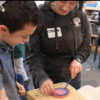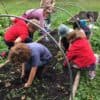by Margot Sands – Ekar Farm – Boulder, Co Parasha Netzavim This week’s Torah portion, Netzavim, offers us the warning of risks and rewards that could result from engaging in Judaism. See for yourself in a snapshot of this week’s Torah portion: Moses delivers a message from G-d about the consequences that may be endured as a result of committing to the Jewish faith. What will happen if we do all that has been commanded of us as Jews? We are given the world. Protection. A full, happy life. Fruits of the earth, of the trees, of the next generation. G-d even offers to plot revenge against our enemies. However, the dark consequence bestowed upon us comes from an angry, spiteful G-d. If we don’t choose the faithful life, then we are choosing death and will perish by the wrath of G-d. As I read this Torah portion’s translation, I was stunned by the dichotomy of choices. We can choose the path of a devout Jew, or we can choose to suffer dire consequences. The reward: a gloriously full life following the word of G-d; The risk: taking a misstep in devotion and enduring G-d’s wrath. This contrast of choices […]
Tag Archives | Weekly Parsha
Parashat Pinchas | D’varim HaMakom: The JOFEE Fellows Blog
by Jaclyn Kellner – Coastal Roots Farm – Encinitas, CA Parashat Pinchas “Take a census of all the congregation of the children of Israel from twenty years old and upwards, following their fathers’ houses…” From here, this week’s parsha, Parshat Pinchas, continues to list out the data from this census for the next 46 verses. There is a concept in Torah study that there is not a single superfluous word. This is also far from the only census recounted in full in the Torah. I am sure I’m not alone when I say that I often skim over this sort of census data, eager to get to a story, a list of laws, or a description of what life was like in biblical times. Data collection and analysis is probably among the least sexy work that nonprofits do. So much time and care is put into designing surveys that many folks then don’t fill out, countless hours are spent entering data from sign in and waiver forms. I often stop during a farm-to-fork type trip to weigh and track the produce before we prepare a tasty snack. After all of this work, it’s the information from those one-sentence testimonies, the […]
Parshat Behar | D’varim HaMakom: The JOFEE Fellows Blog
by Emily Blustein – Jewish Federation of Greater Atlanta – Atlanta, GA Rest for the land, rest for the people, all will be provided. This week we are reading Behar which tells us about shmitah and jubilee. Shmitah is during every seventh year, you shall not work the land, and Jubilee which is the 49th year where shmitah is practiced along with setting all slaves free and all land goes back to its original owners. G-d reassures the people that they have nothing to worry about during shmitah as the 6th year of growing will produce more than enough until the 8th years yield is ready. That’s putting a lot of faith in powers other than your own hard work. What did the farmers do during the 7th year? Did they enjoy or lament it? As I have been dabbling in farming, the thought of not being able to grow food for myself and others for a whole year is a bit unsettling. Truly, if everyone practiced this, what would be there to eat? Or were we all on different shmitah schedules? Maybe my neighbor is only in their 5th year when I’m in my 7th and we alternate sharing… […]
Parashat Tzav | D’varim HaMakom: The JOFEE Fellows Blog
by Rose Chernoff, Abundance Farm – Northampton, MA In this week’s parsha, Tzav, we learn about the rules for how a priest/priestess is to keep the sacrificial fire burning. The instructions are to keep the fire burning all day and all night, and to remove all of the ash in the morning. The fire is to be used for offerings- meat and meal- that is cooked in specific ways…. Sounds old school, I know. ….Enter JOFEE!!!! One of the opportunities that arises on a Jewish Farm is the opportunity to make the words of the torah come to life, or at least seem somewhat more relatable. We can read about fire, and we can also build a fire! We can experience what a fire looks like and feels like, how to start it and tend it and remove the ashes. We can cook with a fire and give gratitude. Experiential lessons give images to the text, and invite participants to enter into a new relationship with this ancient story. In this vein, we at Abundance Farm crafted a “Make Your Own Matzah” and “Grow Your Own Maror” event last weekend. We created two activities (a Matzah station that I will […]
Parashat Pikudei | D’varim HaMakom: The JOFEE Fellows Blog
by Tzachi Flatt, Oshman JCC, Palo Alto, CA Parashat Pikudei tells the story of the construction of the Mishkan, built by the Israelite community under supervision of the Levites. While wandering in the desert, it became a source of comfort and communication for the people of Israel to create a central meeting place where they could connect to G-d. This was constructed to be their divine headquarters. Externally, they were surrounded by the wide expanse of the desert. Internally, they did not know where they were going. G-d saw them in this state, and commanded them to create this space for their own well-being. Parashat Pikudei goes into exhaustive detail about all the pieces of the Mishkan, such a significant undertaking can only be accomplished with the entire community working together cohesively. In thinking about the underlying message of this parasha, at least two key points rose to the surface. Everyone’s contribution to the common goal is not only expected, but is essential to its success. “Do not separate yourself from the community” – Pirkei Avot. We each carry a unique skill set that adds its own value and meaning to the greater good. When we work together towards a […]
Parashat Ki Tisa – The Mitzvah of Tzedaka | D’varim Ha’Makom: The JOFEE Fellows Blog
by Nicole Cruz; Peninsula JCC – San Francisco, CA This week’s Torah portion, Ki Tisa, tells the story of Moses receiving the Ten Commandments from G-d (not once but twice) at Mount Sinai. The first set of Ten Commandments is broken when Moses destroys them in frustration when he witnesses the Egyptians worshiping a god they created because they were impatient waiting for his return from Mount Sinai. Eventually, Moses returns to Mount Sinai and G-d scribes the same words on a new set of stones. After speaking with G-d, when Moses descends Mount Sinai the second time his face is radiating. While this Torah portion contains many significant moments, the part that most resonated with me wast he conversation between G-d and Moses before he leaves Mount Sinai the first time: “Six days shall work be done, but the seventh day is a Sabbath of solemn rest, holy to the Lord. This shall be a perpetual covenant, a sign between Me and the children of Israel forever…” In this well-known quote, we come to understand that we rest on Shabbat because G-d commands it. Reading this Torah portion reminded me of the other Mitzvot that we adhere to. While […]

Parashat Terumah and Passover in the Desert | D’varim Ha’Makom: The JOFEE Fellows Blog
by Daniella Aboody – Wilderness Torah, Berkeley California Parsha Terumah and Passover in the Desert: The Holy Gift of Service This week’s Torah portion is Terumah, which translates to “offering”, “gift”, or “contribution”. In this parsha, God instructs Moses to build the Mishkan (tabernacle), or the holy sanctuary, and the entire parsha of Terumah is a very detailed and specific set of instructions for how Moses and the Israelites are to make and furnish G-d’s dwelling place. It is written: “Dedicate to G-d a contribution. Collect my offering from every person whose heart inspires him/her to generosity: gold, silver, and copper; blue, purple and crimson wool; linen and goat hair; arm skins dyed red, tachash skins, and acacia wood; oil for lighting, spices for the anointing oil and for the incense; precious gems…You shall place in the ark the testimony which I will give to you…I will meet you there and speak from between the angels. There, I will tell you what to command the Children of Israel.” I find this parsha very intriguing – why are these instructions so particular? Is this all really necessary? For these nomadic people of the desert, such highly elaborate and specific requirements for the Mishkan are not […]

Parashat Mishpatim | D’varim HaMakom: The JOFEE Fellows Blog
by Danielle Smith, Eden Village Camp – Putnam Valley NY In last week’s parsha, we received the ten commandments. Before we receive the golden calf, we have nearly a whole parsha of laws showing us how to apply the commandments in our daily lives. This week we receive 53 laws that talk about gender, social justice, courts, serving G-d, criminal law, ethics, and more. After Moses tells the Israelites all of these laws, they respond by saying, “we will do and listen.” These laws acknowledge the values that the ten commandments address and they give us action items for how to apply the principles of the commandments. I hope that we do not blindly follow laws just because they are written, but that we follow laws that are morally right and align with the mission of our collective society. I want to focus on two values in particular that are addressed through the laws in Mishpatim- income inequality and acts of kindness. Mishpatim talks about female servitude and the laws around a poor father selling his daughter to a wealthier family for service and then for marriage. This portion discusses themes of Shmita, saying that after six years, a slave […]
Parashat Yitro | D’varim HaMakom: The JOFEE Fellows Blog
by Tzachi Flat, Oshman Family JCC – Palo Alto, CA In This week’s Torah portion, Yitro, Moses tells his stepfather Jethro the story of the Israelites escape from Egypt. Jethro is very pleased with the story and recites a prayer of gratitude, even though he was not with them in Egypt. Jethro notices Moses dealing with a great deal of the challenges in the group, and advises him to create a council that will help balance the work between the community. After the council is in place and the society is self-governing, Moses is able to go off to his own land. As a JOFEE fellow I can relate to this Torah portion as there are a great many challenges and roadblocks on the path to humans maintaining a healthier, more sustainable planet. Taking on a task of this proportion would be extremely challenging for one person, or even a small group of people to tackle on their own. It is as if we as JOFEE fellows are the council, and our task is to create positive change while educating the community and inspiring them to take similar steps. I am reminded of the Pirkei Avot quote “Do not separate […]
Parsahat Beshalach | D’varim HaMakom: The JOFEE Fellows Blog
by Shani Mink, Pearlstone Center – Reisterstown, MD Blessings, on Blessings, on Blessings: Faith and Wonderment in Beshalach and Tu B’shvat In the parsha of Beshalach we have finally emerged from the darkness of egypt and we are now headed into a different sort of darkness, the darkness of the unknown. Trapped between Pharoah’s army and the Red Sea, the Nation of Israel turns to their leader Moshe and say “Why did you take us out here to die? It would be better to serve the Egyptians than to die out here in the wilderness.” After generations, our ancestors had grown too comfortable with the abuse and degradation of slavery and from this comfort emerged a paralyzing and complacent stagnation. Though their lives in Egypt were dark and full of terrors, it was a familiar plight, a plight in which they knew what to expect. The injustices that pepper our society are just as familiar and the darkness of the unknown just as terrifying. In light of recent political transitions, the plight of dis-empowered groups previously suffering in silence have been brought to the fore. Caught between Pharoah’s army and the Red Sea, we must chose to move forward; it’s now […]
Parashat Va’eira | D’varim HaMakom: The JOFEE Fellows Blog
by Liora Lebowitz, Jewish Farm School – Philadelphia, PA Power from the People: A Story of How Moshe and Aharon Led the Israelite Resistance The parsha Va’eira is the story of Moshe and Aharon’s attempts to free the Israelite people from under Pharoah’s leadership. The parsha begins with G!d reassuring Moshe of G!d’s covenant with the Israelite people and G!d’s promise to free them from the land of Egypt. Moshe tries to tell the Israelites about G!d’s promise but they cannot fathom this happening. G!d instructs Moshe to go to Pharoah himself to demand that the Israelites be freed, a task which Moshe feels inadequate to do partially due to his speech impediment. In the end, Aharon joins forces with Moshe and acts as his speaker, and together they go up against the power of Pharoah. G!d instructs Aharon and Moshe to cast Aharon’s staff before Pharoah and it will turn into a serpent, in order to provide a sign for Pharoah of G!d’s power. This is the first action which Moshe and Aharon take in order to persuade Pharoah to let the Israelites go. Throughout the rest of the parsha, Moshe and Aharon enact the first seven of the […]
Parashat Vayechi | D’varim HaMakom: The JOFEE Fellows Blog
by Rachel Aronson, Hazon – New York, NY Parsha Vayechi tells a story of transition and change. Jacob, lying on his deathbed, calls his sons to his side. Each of his sons, along with Joseph’s sons Ephraim and Menasheh, receive an individual blessing– and some punishments for bad behavior. The blessings recall each person’s individual talents, and lay the groundwork for the creation of the Twelve Tribes. This is not the first time that brothers have gathered around to be blessed, and, compared to other biblical siblings, Vayechi shows an admirable model of coexistence. Earlier in the Torah, difference between siblings has led to warfare- Cain committing the first murder of his brother, Abel; Isaac receiving a blessing while Ishmael is thrown from his home; Jacob stealing the birthright from his twin, Esav. Even this story started with Joseph being sold into slavery, his coat stolen, betrayed by his brothers. But upon Jacob’s death, a different tone emerges about brotherly love. For the first time, difference is made into a positive- twelve tribes with twelve different blessings, destined to fulfill the role of priests, schoolteachers, olive-growers, etc. Participants in the Westchester Jewish Greening Group prepare to March for Clean Energy in […]

Renewing Our Connections – D’varim HaMakom: The JOFEE Fellows Blog
by Bailey Lininger – Tamarak Camps, Ortonville MI Renewing our Connections Editor’s Note: Welcome to D’varim HaMakom: The JOFEE Fellows Blog! Most weeks throughout the year, you’ll be hearing from the JOFEE Fellows: reflections on their experiences, successful programs they’ve planned and implemented, gleanings from the field, and connections to the weekly Torah portion and what they’ve learned from their experiences with place in their host communities for the year. Views expressed are the author’s and do not necessarily represent Hazon. Be sure to check back weekly! Parshat Mikeitz At the beginning of December, the current cohort of JOFEE Fellows convened for the first time since our initial training seminar in June. We traveled, some of us for just a few miles, others for thousands, and came together at the Leichtag Commons property in Encinitas, California. There, we had the privilege of spending five days together. We learned, collaborated, challenged and celebrated each other, and renewed our passion for the work that we are doing as JOFEE fellows across the country. This week, the Torah portion is Mikeitz, and it begins with a story of Joseph helping Pharaoh to interpret his dreams. When reading this passage, I was struck by the sense […]

Honoring the Darkness – D’varim HaMakom: The JOFEE Fellows Blog
by Shani Mink – Pushing the Envelope Farm, Geneva IL & Pearlstone Retreat Center, Reisterstown MD Parshat Vayeishev Editor’s Note: Welcome to D’varim HaMakom: The JOFEE Fellows Blog! Most weeks throughout the year, you’ll be hearing from the JOFEE Fellows: reflections on their experiences, successful programs they’ve planned and implemented, gleanings from the field, and connections to the weekly Torah portion and what they’ve learned from their experiences with place in their host communities for the year. Views expressed are the author’s and do not necessarily represent Hazon. Be sure to check back weekly! P.S. Interested in being or hosting a JOFEE Fellow? Applications for prospective fellows will continue to be reviewed as positions are available. In this week’s Torah portion, Vayeishev, we find Jacob and his family settled in the land of Canaan. After Rachel’s death, her firstborn son, Yoseph quickly becomes his father’s favorite and is given his famous Technicolor Dream-Coat. The special treatment he receives from Jacob incites Yoseph’s brothers’ jealously which is only exacerbated by the retelling of dreams in which he is portrayed as ruling over them. While tending their father’s flocks, the sons of Jacob plot to kill their brother Yoseph, but the eldest, Reuven, implores them […]
Returning Home | D’varim HaMakom: The JOFEE Fellows Blog
by Nicole Cruz, Peninsula JCC, Bay Area, CA Parashat Vayishlach Editor’s Note: Welcome to D’varim HaMakom: The JOFEE Fellows Blog! Most weeks throughout the year, you’ll be hearing from the JOFEE Fellows: reflections on their experiences, successful programs they’ve planned and implemented, gleanings from the field, and connections to the weekly Torah portion and what they’ve learned from their experiences with place in their host communities for the year. Views expressed are the author’s and do not necessarily represent Hazon. Be sure to check back weekly! P.S. Interested in being or hosting a JOFEE Fellow? Applications for prospective fellows will continue to be reviewed as positions are available. JOFEE Fellows Nicole Cruz and Michael Farade complete the high ropes course during the Outward Bound portion of the JOFEE training in May 2016; Photo Josh Kleymeyer This week’s Torah portion, Vayishlach, centers on Jacob’s return to the Holy Land and his encounter with his estranged brother Esau who he has not seen in over 20 years. The night prior to their meeting, Jacob wrestles with a ‘man’ until day break. The next morning, battered from his nighttime confrontation, Jacob and Esau meet and peacefully part ways. While this Torah portion contains many important themes […]



